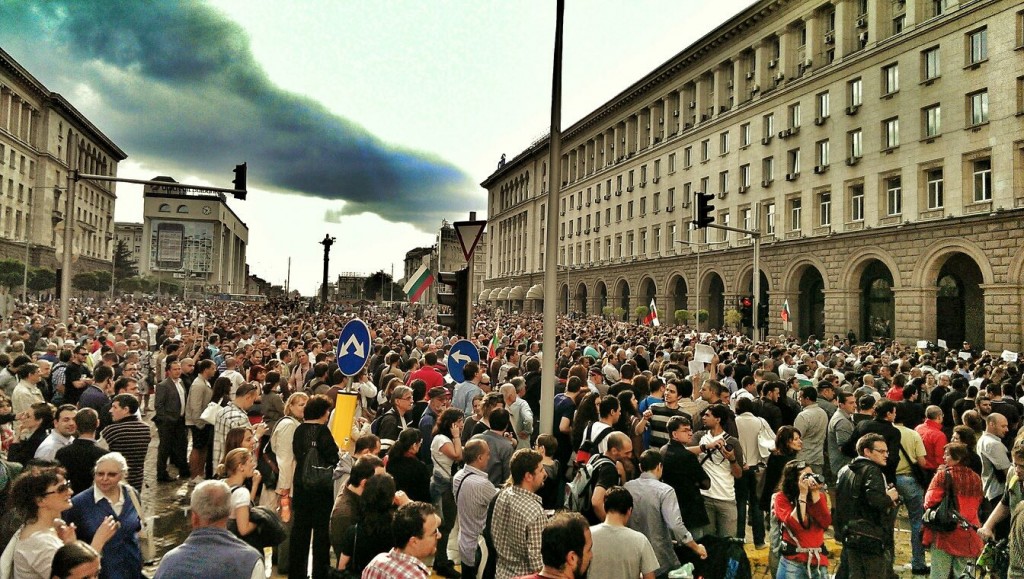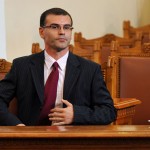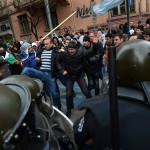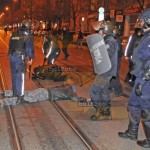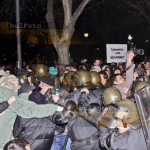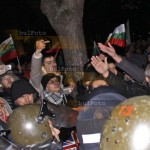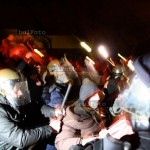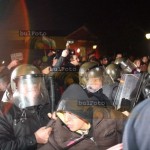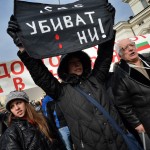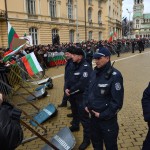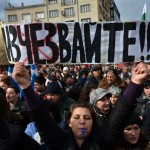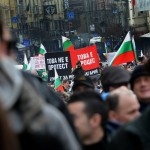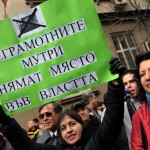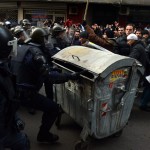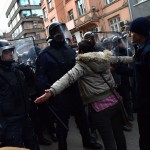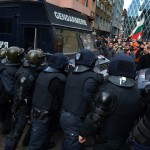New Develpoments in the Master’s Degree of Chaplaincy Ministry in Bulgaria
 The Master’s Degree of Chaplaincy Ministry in Bulgaria was:
The Master’s Degree of Chaplaincy Ministry in Bulgaria was:
- Upgraded to the necessary educational and professional levels, applicable to the specific context of ministry in Bulgaria (December 2010)
- Presented in its upgraded form for approval before the educational board of BETI in 2011 (January 2011)
- Applied in its full capacity with the remaining modules in Theology (Spring 2011), Counseling (Fall 2011) and Master’s Thesis (exp. 2012)
- Transferred to the New Bulgarian University in Sofia under their new social worker studies program.
- Chaplaincy Conference and Master’s of Chaplaincy
- Chaplaincy Course in Yambol, BULGARIA
- Bulgarian Chaplaincy Association Annual Meeting
- Family Seminar for Military Men and Women
- Cup & Cross Ministries in Church of God Publications
- The Case of a NATO Chaplaincy Model within the Bulgarian Army
- 10 Years of Military Ministry in Bulgaria
- Bulgarian Chaplaincy Associations Recognized by U.S. Department of State
- National Chaplaincy Conference
- Bulgarian Chaplaincy Association Gains Legal Status
- Chaplain Dees Visits Bulgaria
- Chaplaincy Course at the Bulgarian Evangelical Theological Institute
- Bulgarian Chaplaincy Association
- Meeting the NATO Chaplain
- National Chaplaincy Meeting
- Chaplaincy Developments in Bulgaria
- U.S. Bases in Bulgaria
- National Chaplaincy Meeting
- Chaplaincy in Bulgaria
- HEALTHCARE CHAPLAINCY IN BULGARIA
- Chaplaincy in Bulgaria
- Mission Bulgaria
Master’s Degree of Chaplaincy Ministry in Bulgaria
 The Master’s Degree of Chaplaincy Ministry was intended to:
The Master’s Degree of Chaplaincy Ministry was intended to:
1) Present a master’s level course work by the Bulgarian Chaplaincy Association and its educational initiative to the Bulgarian Evangelical Theological Institute (BETI) and the Bulgarian Ministry of Education.
2) Be received and approved by BETI as a master’s level educational program on a national level.
3) Aid BETI’s faculty with an international team of qualified professors for the completion of the educational process.
4) Satisfy the educational requirements for a chaplaincy vocation properly contextualized for Bulgaria in association with secular educational institutions, if necessary.
5) Provide the necessary knowledge and practical skills to people with a call on their lives for chaplaincy ministry
- Chaplaincy Conference and Master’s of Chaplaincy
- Chaplaincy Course in Yambol, BULGARIA
- Bulgarian Chaplaincy Association Annual Meeting
- Family Seminar for Military Men and Women
- Cup & Cross Ministries in Church of God Publications
- The Case of a NATO Chaplaincy Model within the Bulgarian Army
- 10 Years of Military Ministry in Bulgaria
- Bulgarian Chaplaincy Associations Recognized by U.S. Department of State
- National Chaplaincy Conference
- Bulgarian Chaplaincy Association Gains Legal Status
- Chaplain Dees Visits Bulgaria
- Chaplaincy Course at the Bulgarian Evangelical Theological Institute
- Bulgarian Chaplaincy Association
- Meeting the NATO Chaplain
- National Chaplaincy Meeting
- Chaplaincy Developments in Bulgaria
- U.S. Bases in Bulgaria
- National Chaplaincy Meeting
- Chaplaincy in Bulgaria
- HEALTHCARE CHAPLAINCY IN BULGARIA
- Chaplaincy in Bulgaria
- Mission Bulgaria
Psychological Exploration of Communist and Post Communist Bulgaria
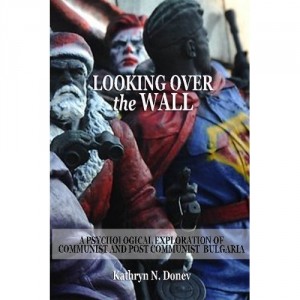 Surrounded with insecurity and uncertainty, the Bulgarian Evangelical believer finds great hope and comfort in the fact that God holds the future in His hands. Christianity is a reality that is certain. While having lived in a culture of oppression and persecution, the Bulgarian Evangelical believer now can trade a downtrodden spirit for one of triumph. The once atmosphere of turmoil is being transformed to one of liberation in the Spirit where chains of slavery are traded for a crown of joyous freedom. Living in the 21st century in a context of post communist and postmodern transformations, Bulgarian Evangelical believers must remain true to their historical heritage and preserve their identity in order to keep their faith alive. This unique testimony must be passed on to future Bulgarian generations by telling the story of the true Pentecostal experience.
Surrounded with insecurity and uncertainty, the Bulgarian Evangelical believer finds great hope and comfort in the fact that God holds the future in His hands. Christianity is a reality that is certain. While having lived in a culture of oppression and persecution, the Bulgarian Evangelical believer now can trade a downtrodden spirit for one of triumph. The once atmosphere of turmoil is being transformed to one of liberation in the Spirit where chains of slavery are traded for a crown of joyous freedom. Living in the 21st century in a context of post communist and postmodern transformations, Bulgarian Evangelical believers must remain true to their historical heritage and preserve their identity in order to keep their faith alive. This unique testimony must be passed on to future Bulgarian generations by telling the story of the true Pentecostal experience.
Prayer and Fasting for Bulgaria
![Fasting[1]](https://cupandcross.com/wp-content/uploads/2014/03/Fasting1-300x187.jpg) Upon Bulgaria’s national holiday (March 3rd), we have called for a 3-day prayer and fasting through our churches in Bulgaria for the following needs:
Upon Bulgaria’s national holiday (March 3rd), we have called for a 3-day prayer and fasting through our churches in Bulgaria for the following needs:
1. National repentance and God’s favor over our nation
2. Political stability in response to the ongoing almost 300-day protest against the current government formation
3. Blessing in place of the increasing economical crises through the eastern countries of the European Union
4. Peace over the increasing military tension in the Black Sea region
5. Complete stop of human trafficking through out the Balkans
Christ and Culture
Richard Niebuhr is one of the most influential modern reformed theologians. He is considered an authority on ethics and church in the Western culture and writes that the authenticity of the Christian faith is based on its realization in a counterpart world setting.
Christ and Culture presents an observation of the ways the church realizes its place in the surrounding world. The central idea of the book is that the church wrestles with both its Lord and with the cultural society with which it lives. In such context, the relevancy of the church’s message to the opposing party remains the central as well. Four models of how the Christian and contemporary realities can interact to seek the answer to how Christian life should be lived are discussed.
Niebuhr approaches culture in general, from a reformed point of view with a definite accent on the present (now) covenant and not so much with apprehension of the eschatological future of the church. His views are based on a mid-twentieth century church operating in a modern Western context. His discussion of the relationship of church and contemporary culture, however, give an opinion much beyond this time making this research valid today.
Niebuhr, believed that the life which Christ commanded from his followers contain values that are essential for the formation of culture and are much needed by the secular world. Christian faith, however, needs to be brought beyond self-separation in order to engage culture with the values of the Christian life. Faith then acts more as a social presence and action which become a transforming factor for society. In a typical reformed manner, the text proposes the church’s involvement in bringing the Kingdom on earth.
The author then uses the four models to examine the variations of the place in culture given to Christ and examines the different effects on society and the church. These models are: (1) Christ against, (2) Christ of, (3) Christ above and (4) Christ transforming culture. They form a literal gradation in the book and serves as the author’s supporting evidence. Christ against culture is a rather “postmodern” approach through which the church rejects modern culture. Such process is in parallel with the life of Christ who not only taught the values of faith but also lived them. Thus, as the church opposes the world, Christian values must become personal acts rather than theoretical descriptive qualifications.
Niebuhr explains that Christ’s rejection of culture was not a result of eschatological expectations, but a result of Him being the Son of God. The realization of Christ’s sonship, then is also the way through which the church should minister in the world. In other words, the church and the life of the Christian must demonstrate Christ’s sonship.
Niebuhr outlines several theological problems in the Christ against culture model as follows (1) reason and revelation, (2) nature and prevalence of sin, (3) relationship of law and grace and (4) the relationship of Jesus Christ to the Creator of nature and Governor of history.
Christ of culture is the second approach which Niebuhr observes. This is another historical overview which speaks much of the Enlightenment. The text discusses several of the thinkers of the day, who attempt to identify Christ with culture. This model shifts the focus from revelation and reason to Christ and culture, as shown in the discussion about Rischl.
The difficulty with cultural Christianity is that it has always been widely rejected. As far as discipleship is concerned, such approach is not more effective than Christian radicalism. The reason for this is that Gnostics and cultural Protestants which Niebuhr describes as lead representatives of this approach create a new mystical image of Christ. When paralleled with the actual Christian story, such images cannot bear the witness of true Christianity and are rejected by both the Scripture and Church.
Christ above culture is the next model which Niebuhr examines, treating medieval representations of a practical synthesis. This synthesis was full of tensions as both sides of the church were corrupt. Regardless of the damages, they both served as means for each other transformation, thus reforming each other. Such synthesis could not be a present day paradigm except if its prerequisites, protesting Christianity and religious institutions, are present in the context of a cultural church able to accommodate such relationship.
The final proposal is the one of the culture-transforming Christ. Unfortunately, this chapter is not as comprehensive as the rest of the observations, perhaps leaving some space for new research and answers. The author spends a great deal of time examining the conversion motif from the fourth Gospel as a model for this culture-transferring Christianity. He then relates it to the theology of Augustine and Maurice and their views of culture transformed by Christ.
In conclusion of this reflection, it must be pointed out that while precise in a great deal of historical facts, Niebuhr is not accurate in the description of the Mennonite Church (Christ Against Culture), perhaps he meant Amish. Also, the definition of culture seems to change through the presentation of different models. Finally, he approaches the relationship of culture and Christianity from a Calvinistic point of view, leaving very little expression of other paradigms outside reformed theology.
Mission Applications
The Fall of the Berlin Wall opened the door toward Eastern Europe and the Soviet republics. Since millions of Eastern Europeans coming out of the Communist Regime could relate to the Pentecostal faith, the numbers of saved and baptized with the Holy Spirit grew by the millions. The result was a multitude of revival fires from the Prague to Vladivostok which unavoidably began changing the local culture.
In the midst of the Pentecostal Eastern European revival, the underground and semi-underground Pentecostal churches coming out of the communist persecution quickly found themselves insufficient to accommodate the need of the new converts for a Pentecostal community. Having had minimal opportunities for education and training under Communism, the only hope was in the supernatural. I In such times, lack of spiritual dependency was replaced by human leadership, self-confidence and wrongful ambitions. Ministers, churches and whole denominations made mistakes which resulted in thousands of new converts being lost for the harvest. Adding clearly Western theological views, church practices and management models were only temporary patches. Like its context of origin, they lasted only enough for the problems to grow and come back in a hunt to destroy human lives. Intense opposition from the schismatic Eastern Orthodox Church, severe economical crises, the lack of political direction, rapidly changing governments and laws were only a few details present as we entered Postmodernity. All of a sudden theologies brought from he west made no sense in the Eastern European context and a sudden need for a new, contextualized Pentecostal paradigm for ministry emerged.
The main question which such paradigm must answer is how a post-persecuted and post-communist church ministers to a postmodern world. In Chrsit-cultural terms, this same question may sound like, “How does a church which has been rejected by Community culture for decades now overcome this rejection and minister to the post-Communist culture.” The answers are many, but the right one must emerge form the identity of the church through a realization that even before there ever was a post-Communist culture in Bulgaria, through rejection of the Communist culture, the church itself was operating within a post-Communist reality. Such paradigm is not strange to the Bible, as the Early Church rejected the Roman reality and operated, similar to a post-Roman reality. The problem with the Bulgarian Protestant church, however, is a very oxymoronic one. This comes from the fact that while outsiders would consider Bulgarian post-Communist culture as a postmodern one, in fact the present Bulgarian culture is pre-modern or at best modern. Since the relationship between postcommunist and postmodern culture is still a new issue, the correct paradigm within such culture must make a decision if the post-Communist culture is pre-modern, modern or postmodern. Such paradigm for ministry will act as a paradigm of cultural transformation.
After 40 days of protests police removes protesters from Parliament square in Sofia, Bulgaria
Comments Off on After 40 days of protests police removes protesters from Parliament square in Sofia, Bulgaria
Anti-government protests in Bulgaria’s capital have been going on for 40 days, and escalated Tuesday evening as several hundred demonstrators trapped the officials inside Parliament in a bid to oust the left-leaning government.
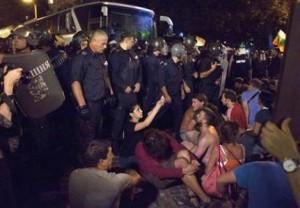 (Reuters) – Hundreds of protesters built barricades around Bulgaria’s parliament, effectively trapping over 100 lawmakers, ministers, and journalists in the building for more than seven hours on Tuesday following a brief scuffle with police. Protesters pulled out sidewalk tiles and piled garbage bins to cut off roads to Bulgaria’s parliament, shouting “Mafia!” and “Resign!” and “Red Garbage!”, to keep the deputies under blockade until the Socialist-led government steps down. An earlier attempt to get deputies out of the parliament with a bus led to a scuffle with police. It was aborted after protesters threw bottles and other objects at the bus, while others sat in front of it.
(Reuters) – Hundreds of protesters built barricades around Bulgaria’s parliament, effectively trapping over 100 lawmakers, ministers, and journalists in the building for more than seven hours on Tuesday following a brief scuffle with police. Protesters pulled out sidewalk tiles and piled garbage bins to cut off roads to Bulgaria’s parliament, shouting “Mafia!” and “Resign!” and “Red Garbage!”, to keep the deputies under blockade until the Socialist-led government steps down. An earlier attempt to get deputies out of the parliament with a bus led to a scuffle with police. It was aborted after protesters threw bottles and other objects at the bus, while others sat in front of it.
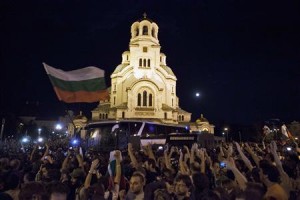 Thousands of Bulgarians have been protesting almost daily in Sofia since last month following a government decision to name a powerful media magnate as security chief, which many see as an example of private interests controlling state institutions. The government’s withdrawal of the appointment failed to quell public discontent in the European Union’s poorest country, which also is one of the bloc’s most corrupt. Seven protesters were treated for head injuries, the national radio said. Two police officers were also wounded.
Thousands of Bulgarians have been protesting almost daily in Sofia since last month following a government decision to name a powerful media magnate as security chief, which many see as an example of private interests controlling state institutions. The government’s withdrawal of the appointment failed to quell public discontent in the European Union’s poorest country, which also is one of the bloc’s most corrupt. Seven protesters were treated for head injuries, the national radio said. Two police officers were also wounded.
Bulgaria Protests – Day 12 at Independence Square in capital Sofia
Comments Off on Bulgaria Protests – Day 12 at Independence Square in capital Sofia
EVERY day, for the last twelve days, at exactly 6:30pm, Independence Square, a busy intersection in the center of Sofia, has been the starting point for a protest march that passes by the parliament building, the so-called Eagle’s bridge and the National Palace of Culture. Around 10,000 people participate every evening. They are calling for more transparency, less corruption and an end of the local oligarchs’ rule.
Only three weeks into the job, the new Bulgarian government is facing the fate of the old one. Large-scale protests are being held daily not only in Sofia but other major cities too just four months after demonstrations forced the previous conservative administration to resign. The protests were sparked by a string of dodgy appointments by the new government. The most controversial was the nomination of the Bulgarian Kim Dotcom, Delyan Peevski, a 32-year-old media mogul, as head of the powerful national security agency. A member of DPS, the ethnic Turkish party, the junior coalition partner in the Socialist-led government, Mr Peevski controls a media empire of numerous high-circulation newspapers, popular TV channels and news websites all of which tend to change allegiance according to who is in power. Mr Peevski’s political résumé is equally questionable: after spending two years as a deputy minister in a previous Socialist-led government, he was fired in 2007 and prosecuted on extortion and corruption charges. (He was eventually cleared.)
“My trust in this government is gone after this appointment,” said Rosen Plevneliev, the president, who questioned Mr Peevski’s “reputation and competence”. As the protests gathered speed, Mr Oresharski admitted the appointment was a mistake and parliament reversed the decision.
But the U-turn failed to appease the protesters. They are now demanding the resignation of the whole government as well as changes in the electoral law to allow smaller parties to enter parliament. Unlike the demonstrations earlier this year, the current rallies are largely peaceful. More and more members of the middle class are joining the protests, including popular actors, writers and musicians as well as families with babies and strollers.
“We feel that nobody is steering the boat,” says Mihail Vuzharov, one of the protestors who is a marketing specialist at a medical IT startup. “In fact, the boat has been sinking for decades.” Therefore, adds Justine Toms, a business-development manager in Sofia, “we are protesting against the people who should be in jail and are instead appointed at high posts in the state.” Most Bulgarians tend to agree with Mr Vuzharov and Ms Toms: over 80% say they support the protests, according to a poll by Alpha research. Today sixty prominent intellectuals, lawyers, journalists and human rights activists posted online a “charter for disbanding the plutocratic model of the Bulgarian state” calling for genuine democracy and the rule of law .
The wide backing by Bulgaria’s society (the educated elite in particular) makes the situation extremely tough for the government according to Tihomir Bezlov, political analyst with the Center for the Study of Democracy in Sofia. Most analysts agree that it won’t be able to serve its full four year term. In fact, the odds were against the government of Mr Oresharski from the very beginning. The Socialist party was able to form a cabinet only because GERB, the ex-ruling party of Boiko Borisov which won the May 12th snap elections, was unable to muster a parliamentary majority. With only half of the votes in parliament, the Socialists and their partners from DPS were left reliant on the unpredictable, ultra-nationalist Ataka party.
After twelve days of protests and with new ones planned for the coming weeks, the risk of yet another early election is increasing. Demonstrators will continue to gather at Independence Square every evening…
New Protests in Bulgaria over New Security Chief
Comments Off on New Protests in Bulgaria over New Security Chief
BBC News: Opposition MPs in the Bulgarian parliament have protested after a media tycoon was appointed to head the national security agency.
Delyan Peevski, 32, a member of the country’s Turkish minority party, was voted into the post without a debate by the ruling Socialists and their allies. He had been nominated by the new Prime Minister, Plamen Oresharski. President Rosen Plevneliev demanded a review of the vote, questioning Mr Peevski’s “reputation and competence” as a crowd of thousand protesters gathered outside parliament in the capital, Sofia.
Mr Peevski joined a Socialist-led government in 2005 as deputy emergency response minister but was sacked two years later and investigated over corruption allegations. The investigation was later dropped. The Socialists have been governing in a fragile minority government as a result of last month’s general election, which followed unrest over the country’s economic crisis.
External specialist: Mr Oresharski has defended the appointment of Mr Peevski, saying Bulgaria needs to take serious steps to stop organised crime and smuggling and he is best suited for the job, despite lacking experience. “Peevski was chosen because he is not part of the system and we deliberately looked for such an external specialist so that he can restructure it,” he told reporters.
However, the speed of the appointment has raised questions. British Ambassador Jonathan Allen wrote on Twitter: “The appointment has been rushed through with no hearings, debate or opportunity to find out about candidate. Why?” President Plevneliev, from the Gerb party which lost the election, said the decision would have “longstanding negative consequences for Bulgaria”.
Leadership Crisis in Bulgaria
 As Bulgaria is celebrating its Liberation Day on March 3rd, protests are still going on in most major Bulgarian cities. Neither the resignation of the Prime Minister and the leading party from the government amidst deepening economics crises, nor the appointment of a new patriarch to the Orthodox Church was able to calm the crowds who have been out in the streets for weeks now. General government elections are scheduled for May 12, 2013 while the President is working with parliament on forming an interim government.
As Bulgaria is celebrating its Liberation Day on March 3rd, protests are still going on in most major Bulgarian cities. Neither the resignation of the Prime Minister and the leading party from the government amidst deepening economics crises, nor the appointment of a new patriarch to the Orthodox Church was able to calm the crowds who have been out in the streets for weeks now. General government elections are scheduled for May 12, 2013 while the President is working with parliament on forming an interim government.
After the last election some four years ago, political analysts working closely with our ministerial team warned that if newly elected government continues to use the same local level (city, municipality) political paradigms to run the country as a member of the European Union, crises will be inevitable. This was obvious even to the social concern grassroots including our chaplaincy program and para-church ministries.
Two years later, as half of the parliamentarian term has passed, we further advised in “Election’s Perspectives for Bulgaria” that as Bulgaria’s Prime Minister elect did not take the much expected place as a presidential candidate, his political strategy has been strongly criticized by his opponents as inadequate and insufficient to answer Bulgaria’s current crises. Amidst the global economic collapse, it was reasonable to suggest that similar socioeconomic shifts will not be long before appearing in Bulgaria.
The year 2013 began with a political distress in one of Bulgaria’s ethnic parties through a “backstage” attack against their soon to resign leader. The opposition responded immediately releasing a secret dossier code named “Buddha” revealing the Prime Minister working as a secret agent for the communist government police. His resignation, along with the resignation of the whole Cabinet, followed less than two weeks later as protests swept the streets of Bulgaria in the month with lowest temperatures, highest electric bills and of course highest rate of the government disapproval.
Meanwhile, after almost entering Bulgaria’s parliament in 1997, the Bulgarian Christian Coalition, traditionally representing the Protestants in the country, remains on the borderline of any political existence. Bulgarian evangelicals were never able to reach their political legacy again, although the new Bulgarian census showed over 25% increase of evangelical population in Bulgaria to some 65,000 people strong. The alternative party, Christian Democratic Forum has showed no political activity since it was established a decade later and quickly defeated by having less than 1,000 votes nationwide. The Bulgarian Christian Coalition has also chosen not to run in the upcoming elections.
Bulgaria Axes Finance Minister
 JOE PARKINSON, The Wall Street Journal
JOE PARKINSON, The Wall Street Journal
SOFIA—Bulgaria sacked its finance minister on Monday after a weekend of demonstrations over electricity prices brought tens of thousands onto the streets, raising pressure on a government that had until recently defied political gravity by retaining popularity in the teeth of an austerity drive.
Simeon Djankov, a former World Bank official who won the respect of financial markets for undertaking painful reforms but courted controversy in Bulgaria as a fiscal hawk, was relieved from his duties as finance minister by Prime Minister Boyko Borisov on Monday, the government said in a statement. The prime minister proposed Tomislav Donchev, the minister responsible for European Union funds, for the post, the statement said.
The news, which took analysts by surprise, comes as Mr. Borisov’s ruling center-right Citizens for European Development of Bulgaria party, or GERB, is facing mounting pressure after a series of antiausterity protests and corruption scandals have dramatically eroded popular support for its policies.
Sunday saw Bulgaria’s largest demonstration for more than a decade as tens of thousands of protesters gathered in more than a dozen regions, paralyzing city centers and blocking highways. Venting their anger against high electricity bills, the protesters demanded the resignation of the cabinet and the re-nationalization of power distributors. Electricity prices are politically sensitive in the EU’s poorest member state, where power bills bite off a large chunk of monthly incomes, especially during the winter.
Hewing to a tight fiscal policy and navigating the financial crisis without taking a foreign bailout, Bulgaria has stood as one of the EU’s fiscal brightspots, comparing favorably to regional economies Hungary and Romania, which have been plagued by steeper recessions and political turmoil.
But analysts warned that the removal of Mr. Djankov, the government’s most high-profile technocrat, would likely foreshadow a shift toward more populist economic policies ahead of national elections tabled for July.
“Djankov was the figure who symbolized fiscal and financial discipline. The whole economic policy was based on these priorities,” said Daniel Smilov, program director at the Center for Liberal Strategies, a Sofia-based think tank. “Now there is an expectation that some change in economic course is imminent and that may make some people nervous.”
There were signs that Czech power company CEZ AS, BAACEZ.PR -0.44% which has been the focus of popular anger at rising energy prices, could be in the cross hairs of a more populist policy. Bulgaria’s Energy Economy and Tourism Ministry said on its website on Sunday that the national energy regulator was considering whether to revoke CEZ’s license due to allegations the company violated public-procurement rules. CEZ, which insists it hasn’t breached regulations, had 9.9 % of its 2011 revenue from Bulgaria, making it the company’s second-largest market after the Czech Republic.
Bulgaria’s opposition leaders on Monday sought to build pressure on Mr. Borisov, stressing that the removal of Mr. Djankov would not alleviate public anger.
“This move means Borisov is panicking…The change is not enough, we need a new government and new rules,” said Ivan Kostov, former Prime Minister and leader of the rightist Democrats for Strong Bulgaria party was quoted as saying by Bulgarian state media.
On the periphery of the euro zone, but overwhelmingly dependent on the bloc’s larger economies for growth, Bulgaria won admiration from Brussels by reducing its budget deficit to 0.5% of gross domestic product last year from 2% in 2011. The economy managed a 0.5% expansion in the fourth quarter from a year earlier, marking its 10th successive quarter of growth
But opinion polls in recent months showed a precipitous decline in the ruling party’s ratings after three years of austerity policies, corruption scandals snaring cabinet ministers and a lack of significant results in fighting crime and graft.
A lead of 15 percentage points last year has evaporated in recent months, placing GERB level with the Bulgarian Socialist Party, according to recent polling. Analysts say that electoral arithmetic would make it very difficult for Mr. Borisov to form a single-party government at national elections and could prompt the Prime Minister to call a snap poll in the Spring. On the streets of Sofia on Monday, residents appeared polarized about the news.
Boiana Stoyanov, a 34-year old hotel manager said Mr. Djankov had been made a “scapegoat” and his ouster showed the coming election campaign “will be dirty.” Tsvetan Tcherneva, a pensioner who demonstrated in Sofia on Sunday said he was surprised Mr. Djankov lasted so long. “He brought American ideas and took an ax to pensions and to state wages. The government is in serious trouble now,” he said.



